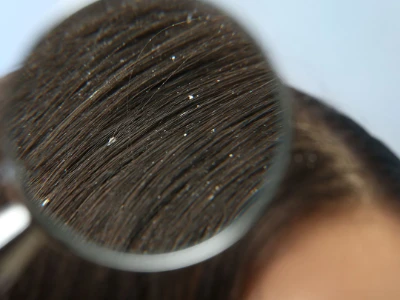Over-the-counter vs prescription for dandruff shampoo
2:30 MINUTE READ TIME

Introduction
Dandruff is an everyday condition affecting a wide range of people. Apart from causing the skin on the scalp to flake, it can also leave your scalp feeling irritable and make you feel self-conscious.[1]
But how you should treat this condition? Do you use an over-the-counter solution, or head straight for a prescription shampoo—and what is the difference?
Let’s say that you’re experiencing a mild case of dandruff. Your first step will be to try a gentle daily shampoo. If for some reason dandruff persists, the next step is to try a medicated shampoo.[1] Both over-the-counter and prescription-only shampoos can be medicated. Read on to learn more about the difference between various over-the-counter anti-dandruff shampoos and prescription-only shampoos.
Over-the-counter vs prescription dandruff shampoo
Two major differences are that over-the-counter shampoos will have lower concentrations of active ingredients than prescription strength shampoos and contain different active ingredients than prescription strength shampoos. Although medicated shampoos, like selenium sulfide shampoo, can be purchased over the counter, stronger formulations may require a doctor’s prescription.[2]
Examples of medicated shampoos
The various anti-dandruff shampoos that might be available to you will always be classified according to the type of medication that they contain. Remember that some of these recommended products are also going to be available in stronger formulations—but only by prescription.[3]
-
Selenium sulfide shampoos: These always contain a useful and effective antifungal agent. You must always use these products as directed by the instructions and be sure to rinse well after shampooing.[3]
-
Pyrithione zinc shampoos: These shampoos contain the antibacterial and antifungal agent zinc pyrithione.[3]
-
Shampoos containing salicylic acid: These products are effective in the elimination of any scaling you might be experiencing.[3]
-
Fluocinolone shampoos: These products contain a corticosteroid, which helps manage and control any itching, flaking, and irritation that you might be experiencing.[3]
|
Type of shampoo |
Over-the-counter |
Prescription |
|
Salicylic acid |
X |
|
|
Pyrithione zinc |
X |
|
|
Selenium sulfide |
X |
X |
|
Fluocinolone |
X |
Selsun blue® have a range of anti-dandruff shampoos, some of which are medicated, that are available without prescription. To ensure you find the right shampoo for you, browse our product page to find out more about each of our products. We can also help you to buy the product you need over the counter with our where to buy page.
Maximum strength
“Maximum strength anti-dandruff formula for fighting tough dandruff symptoms.”
.png)
Daily care
“Still tough on dandruff but gentle enough for everyday use”
.png)
Naturals
“Formulated with 8 intensive moisturizers, botanicals, vitamin B5, and vitamin E to promote healthy-looking hair.”
.png)
When to see a doctor for a prescription for dandruff
If you've been using an over-the-counter medicated shampoo regularly for a couple of weeks but are still experiencing signs of dandruff, talk to your doctor or a recommended dermatologist. It could be that you now need a prescription-strength shampoo. They may also suggest a steroid lotion if they think this is a better option for you.[3]

What to expect
The good news part! You won’t need any time-consuming preparation for an appointment to diagnose dandruff. Your doctor will most likely be able to diagnose your symptoms simply by looking at your scalp and your skin. One thing to remember is that if you've been using any new hair-care products, bring the bottles with you to your appointment. Your doctor or dermatologist will find this very helpful. Also, be prepared to tell whoever you’re seeking advice from about how and what you’re using; this may help them to understand what the root cause of your dandruff is.[3]
When you’re at your appointment, your doctor will ask you various questions. Being prepared with all the relevant information will speed up the process and give you extra time to go over any points you might want more information on.[4] Take a look at some of the questions your doctor may ask:
-
Describe your symptoms in detail. When did you first notice them?[4]
-
Is this the first time you've had any of these symptoms, or have you experienced them in the past?[4]
-
How severe do you feel your symptoms are? Are they roughly the same all the time, getting worse, or are they sometimes better and then sometimes worse?[4]
-
Have you tried any at-home treatments yet, such as creams, gels, or shampoos?[4]
-
If yes to the above, how often do you use any of these treatments?[4]
-
Have you kept a diary or timeline of when this started, noting what you have used, when it seems worse, and how it makes you feel?[4]
-
Have you been stressed? (Dandruff is sometimes linked to a stressful lifestyle.)[4]
Conclusion
Dandruff is a common everyday problem that affects anyone from any background. You shouldn’t feel embarrassed to seek advice from the right professionals, as there is a wealth of information out there and this condition can be managed effectively over time. By taking the right steps—such as understanding the major differences between over-the-counter, prescription, and medicated shampoos—you’ll be on the right path to managing the condition in a safe and effective way.
Find the right product for you
If you’re not sure which shampoo might be best to use, try our Selsun Blue® product selector. Answer a few simple questions to find the shampoo that works best for your hair type and concerns—and ditch the dandruff.
References
-
Dandruff - Symptoms and causes (2022). Available at: https://www.mayoclinic.org/diseases-conditions/dandruff/symptoms-causes/syc-2035385 0 (Accessed: 22 February 2022).
-
Gavazzoni Dias, M. et al. (2014) "The shampoo pH can affect the hair: Myth or Reality?", International Journal of Trichology, 6(3), p. 95. doi: 10.4103/0974-7753.139078.
-
Dandruff - Diagnosis and treatment - Mayo Clinic (2022). Available at: https://www.mayoclinic.org/diseases-conditions/dandruff/diagnosis-treatment/drc-20353854 (Accessed: 22 February 2022).
-
Seborrheic dermatitis - Diagnosis and treatment - Mayo Clinic (2022). Available at: https://www.mayoclinic.org/diseases-conditions/seborrheic-dermatitis/diagnosis-treatment /drc-20352714 (Accessed: 22 February 2022).
Antidandruff . Daily use . Moisturizing . Thicker-looking hair
.webp)







